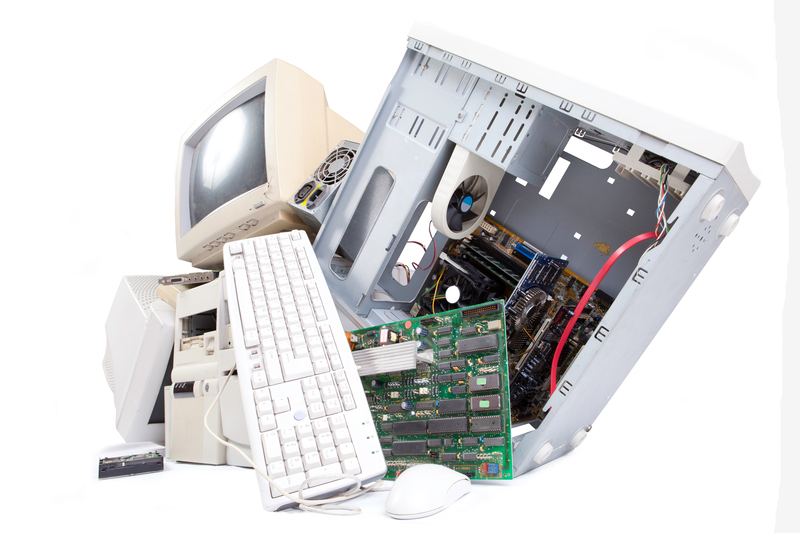How Waste Clearance Services Support Our Ecosystem
Waste disposal and management are critical challenges facing societies worldwide. Waste clearance services play a key role in ensuring that waste is not just removed from our sight, but handled in a way that protects our ecosystem and sustainability goals. In this comprehensive article, we'll delve into how various waste clearance solutions actively safeguard natural environments, improve urban spaces, stimulate the economy, and encourage greater environmental awareness.
Understanding the Role of Waste Clearance Services
Every day, households, businesses, and industries generate significant amounts of waste. Traditional disposal methods--such as dumping in landfills--are no longer sustainable given their environmental impact. That's where waste collection services and modern disposal methods come into play. These services aren't just about removing rubbish; they are designed with an eco-conscious attitude towards recycling, reducing landfill use, and minimizing harmful emissions.
Definition of Waste Clearance Services
- Residential waste collection: Removal of household garbage, bulky items, and recycling.
- Commercial waste management: Clearing business sites, retail stores, and restaurants of daily and specialty waste.
- Construction debris removal: Handling demolition, refurbishment, or site clearance.
- Hazardous waste disposal: Safe collection of materials like paint, batteries, solvents, and electronics.

Why Is Responsible Waste Clearance Crucial for the Ecosystem?
Irresponsible waste disposal leads to pollution of land, air, and water. By contrast, eco-friendly waste clearance services are designed to support and protect our environment in the following ways:
- Reducing pollution and environmental degradation
- Preserving natural habitats and biodiversity
- Lowering greenhouse gas emissions
- Encouraging sustainable resource use
Key Ways Waste Clearance Services Support Our Ecosystem
1. Minimising Landfill Waste and Its Impact
Landfills are known to produce methane, a potent greenhouse gas that contributes significantly to climate change. Moreover, leachate--the liquid produced as waste decomposes--can seep into soil and contaminate groundwater. Waste clearance companies strive to divert material away from landfills by prioritising recycling and reuse wherever possible.
- Segregation at source ensures recyclables and compostables are separated effectively.
- Modern services often invest in Material Recovery Facilities (MRFs) to further sort and process waste.
- Better sorting means fewer items end up buried in landfills, reducing the risk to soils, plants, and wildlife.
2. Promoting Recycling and Resource Recovery
One of the fundamental principles of modern waste management is the circular economy--designing waste out of the system so that materials are reused, recycled, or composted rather than discarded. Waste clearance companies actively support this concept by:
- Collaborating with local recycling centres and reprocessors to redirect plastic, glass, metal, and paper waste.
- Educating customers about how to separate their waste for maximum recycling impact.
- Offering specialist electronic waste (e-waste) clearance to keep hazardous materials such as lead, mercury, and cadmium out of the ecosystem.
- Promoting composting of organic waste to enrich soil health rather than create harmful emissions in landfill.
3. Reducing Illegal Dumping and Litter
Illegal dumping--also known as fly-tipping--remains a major threat to natural habitats, water systems, and public health. Professional waste collection services reduce this risk by providing convenient, affordable, and reliable alternatives for all waste types. Their activities lead to:
- Cleaner streets, parks, forests, and rivers.
- Fewer disease outbreaks linked to rotting garbage or hazardous substances.
- Prevention of wildlife entanglement or intoxication by improperly disposed plastics or chemicals.
The Environmental Impact of Efficient Waste Disposal Services
1. Cleaner Air and Water
Inappropriate dumping or open burning of waste can release toxic chemicals and particulate matter into the air, contributing to respiratory issues and air pollution. Similarly, waste that isn't properly contained can wash into nearby rivers and lakes during heavy rains, leading to water contamination. Waste clearance professionals use:
- Sealed containers and covered vehicles to prevent litter and leachate escape during transport.
- Properly licensed disposal facilities that process and treat waste to neutralize toxins and prevent leaching.
- Regularly scheduled pickups to reduce the build-up of garbage that could potentially pollute local air and water supplies.
2. Conservation of Resources
Resource conservation is one of the biggest advantages of responsible waste removal. Recycling metals, paper, glass, and plastic means less need for mining, logging, or drilling--all of which can have severe impacts on habitats and biodiversity. By:
- Encouraging recycling, waste collection services help reduce the pressure on finite natural resources.
- Supporting local manufacturing using recycled materials, thus closing the loop and boosting green jobs.
3. Restoring & Protecting Local Habitats
Removing unwanted debris from abandoned urban areas, parks, woodlands, and waterways helps to restore these areas as functioning ecosystems. Waste removal teams contribute to:
- Supporting pollinators (like bees and butterflies) whose habitats would otherwise be choked by waste.
- Enhancing urban biodiversity by clearing sites for new tree planting or community gardens.
- Protecting aquatic life by ensuring rivers and lakes remain unpolluted by plastics and chemicals.
Societal Benefits Driven by Waste Clearance Services
Beyond environmental protection, waste clearance creates a broad range of societal advantages:
Boosting Public Health
- Timely waste removal prevents the accumulation of disease vectors, such as rodents, flies, and mosquitoes.
- Proper disposal of hazardous materials--like old paint, solvents, or medications--reduces the risk of accidental poisoning.
Improving Urban Aesthetics & Livability
- Cities and neighborhoods free from litter are more inviting and attractive to residents and visitors.
- Increased property values and investment in clean, maintained areas.
Creating Green Jobs
- The waste management sector is a significant employer, providing stable careers in recycling, logistics, and environmental engineering.
- Growth in recycling and reuse markets yields new opportunities for entrepreneurship and innovation.
How Waste Clearance Services Foster Environmental Awareness
Modern waste removal companies often invest in outreach and education programs to inspire clients and communities to make eco-friendly choices. This is essential for long-term progress because:
- It encourages people to separate recyclables, reduces contamination, and increases recovery rates.
- Supports local authorities in reaching zero waste initiatives and climate targets.
- Empowers individuals and businesses to think about consumption, waste minimization, and product life cycles.
Technological Innovations in Waste Management
Waste clearance is an evolving industry, embracing innovation to support the ecosystem more effectively:
- Smart bins with sensors optimize collection routes, reducing fuel consumption and emissions.
- Advanced sorting systems use AI and robotics for more accurate material recovery.
- Biological treatment plants convert organic waste into biogas, generating renewable energy.
- Data analytics help municipalities track waste generation and identify opportunities for improvement.
The Connection Between Waste Clearance and Circular Economy
The principle of the circular economy--"make, use, return"--is at the heart of progressive waste clearance. Instead of burying resources forever, materials are kept in use for as long as possible. Waste management services support this by:
- Identifying items suitable for resale, refurbishment, or donation to charities, thereby preventing unnecessary disposal.
- Collaborating with upcycling initiatives that turn waste into art, furniture, or construction materials.
- Providing feedback to manufacturers to design products that are easier to repair, recycle, or disassemble.
Choosing the Right Waste Clearance Services for Environmental Impact
For homes and businesses seeking to maximize their environmental contribution, it's important to choose waste clearance providers with proven green credentials:
- Look for companies that are licensed, insured, and comply with all local and national regulations.
- Ask if they provide clear evidence of landfill diversion, recycling rates, or environmental certifications such as ISO 14001.
- Review their policies on hazardous materials, e-waste, and organic waste processing.
- Choose firms that educate customers, provide detailed waste reports, and help reduce the overall volume of waste sent to landfill.
Community-driven Initiatives and Partnerships
A growing trend in waste management is community-led waste collection--neighbours, schools, and charities collaborating with professional services to organize litter picks, recycling drives, or furniture swap events. These initiatives:
- Build social cohesion and a shared sense of responsibility for the environment.
- Divert waste from landfill by finding new uses for unwanted items.
- Support those in need through charity shops and donation hubs.

Frequently Asked Questions about Waste Clearance and the Ecosystem
- What is the difference between rubbish removal and waste clearance services?
Rubbish removal generally refers to one-off or bulk disposals, while waste clearance services offer ongoing, scheduled, and specialized collection for recycling, reuse, and safe disposal. - How does recycling benefit the ecosystem?
Recycling conserves resources, reduces greenhouse gas emissions, and prevents environmental pollution by keeping reusable materials out of landfill and natural habitats. - Is professional clearance necessary for hazardous waste?
Absolutely. Hazardous waste--like chemicals, electronics, and asbestos--requires specialist handling to protect both people and ecosystems from harm.
Conclusion: Small Steps to a Healthier Planet
Waste clearance services are much more than a convenience--they are a *critical component* of protecting the ecosystems that sustain life. By enlisting the support of responsible, innovative, and eco-conscious waste removal providers, both individuals and organizations can make significant strides towards a greener, cleaner, and more sustainable future. Whether it's reducing landfill, supporting recycling, or educating the next generation, *every effort counts*. Take the next step today, and let your choice of waste clearance provider reflect your commitment to the planet.
Remember: How we manage our waste not only shapes our immediate surroundings but echoes into the balance of our entire ecosystem for generations to come.